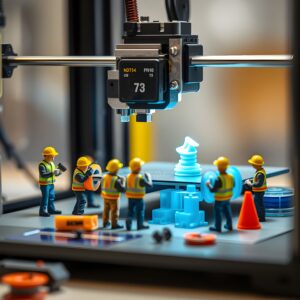HP 3D Printers for Sustainable Design

In an era where sustainability has become a necessity, HP 3D printers are emerging as a vital tool for eco-friendly product design. With their cutting-edge technology and commitment to reducing environmental impact, HP is empowering businesses and designers to create sustainable products with reduced waste and a smaller carbon footprint.
HP’s Commitment to Sustainability
HP is well-known for its dedication to sustainability, and its 3D printing technology is no exception. The HP Jet Fusion 3D printers are designed to use eco-friendly materials, including bioplastics and recycled polymers, which significantly reduce the reliance on virgin materials. Additionally, these printers operate with high energy efficiency, minimizing the overall environmental impact of the manufacturing process.
Transitioning to 3D printing can dramatically cut down on material waste compared to traditional manufacturing methods, as objects are created layer by layer with minimal excess.
Benefits of Using HP 3D Printers in Sustainable Design
-
Material Efficiency:
HP 3D printers allow for the precise use of materials, which reduces waste. Products are made with only the necessary amount of material, and excess material can be recycled or reused in future prints. -
Eco-Friendly Materials:
HP has partnered with several companies to develop recycled 3D printing materials, such as nylon and TPU, which are derived from sustainable sources. -
Energy-Efficient Printing:
HP’s advanced 3D printers are engineered to consume less energy while maintaining high productivity, helping businesses lower their energy consumption and carbon emissions. -
Closed-Loop Recycling Systems:
HP supports closed-loop recycling in its 3D printing process, where used materials are collected and reprocessed to create new filament for future prints.
Applications of HP 3D Printing in Sustainable Design
Designers and manufacturers are increasingly relying on HP 3D printers to develop products that meet eco-friendly standards. From furniture and household items to automotive parts, HP’s 3D printing technology allows for sustainable, on-demand production, which minimizes overproduction and excess inventory.
One inspiring example is the creation of customized, lightweight automotive parts using HP 3D printers. These parts not only reduce fuel consumption but are also produced using recycled materials, contributing to a circular economy model.
HP 3D printers offer a pathway to more sustainable product design by reducing waste, supporting the use of recycled materials, and enhancing energy efficiency. For businesses and designers looking to minimize their environmental impact while still producing high-quality, innovative products, HP’s 3D printing technology is a critical tool in the move towards a greener future.
Visit our other website: aibrainpowered.com




